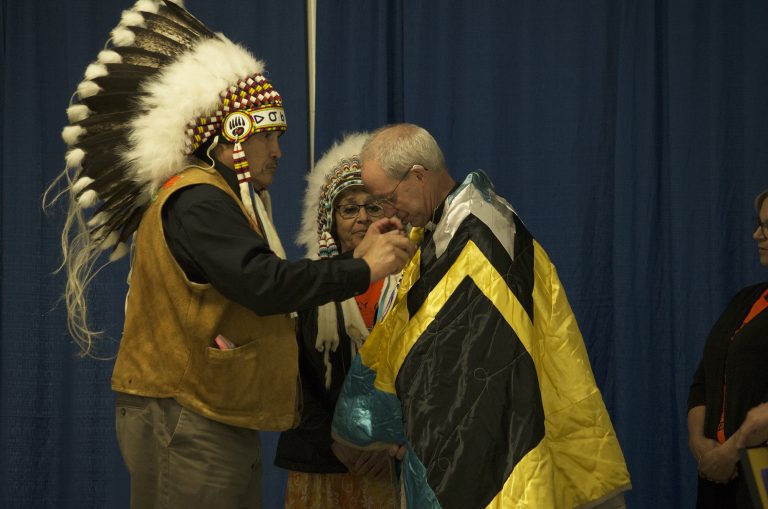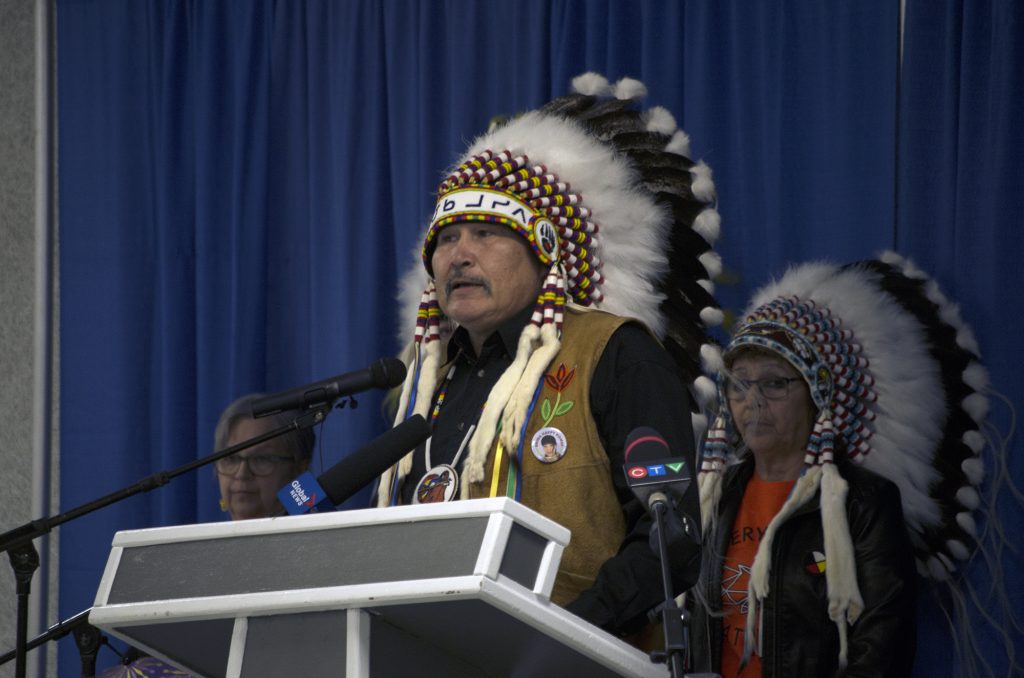
The spiritual head of the Anglican Church offered a formal apology for the harm caused by the denomination’s residential schools, but said further actions will take time to sort out.
The Most Rev. Justin Welby spoke to a small gathering of Indigenous leaders and former residential school students at the Prince Albert Exhibition Centre on Sunday after preaching at St. Alban’s Anglican Cathedral. Welby originally planned to read a formal apology prepared prior to the gathering, but instead offered an improvised apology after hearing stories of abuse and neglect at various Anglican-run schools, including All Saints in Prince Albert.
Welby said those stories were “the stuff of nightmares” and promised further actions and visits to other First Nations communities in the future. However, he also said any action that follows the apology—like financial support—would not come quickly.
“It’s got to be sorted out (to decide) what that looks like, how it’s done and how it’s used,” Welby told reporters afterwards. “As with the survivors of, for instance, childhood abuse in the church of England, it’s case-by-case. As with what we’re thinking about on slavery, (we’re asking) what (does) restitution and healing look like? Can you do it with people carefully to make sure it’s not a one-off virtue-signalling splash which then makes no long-term difference?”
Welby said his position does not allow him to unilaterally make the kind of promises and commitments some former students called for on Sunday. However, he promised to work within the church structure “on the right approach” for dealing with the abuse of Indigenous peoples, which he said is also a significant issue in other countries like Australia and New Zealand.
The Archbishop also faced calls to revoke the Doctrine of Discovery, a 1493 Papal Bull that gave Christian rulers the right to claim any land not inhabited by Christians. Welby said revoking the doctrine is not in the Anglican church’s power, but told reporters he would speak to Pope Francis about it at their next meeting.
Former residential school students in attendance like George Mirasty welcomed Welby’s apology. Mirasty said he was standing next to the Archbishop after Saturday’s event in James Smith Cree Nation when Welby said he was so sorry for what Mirasty experienced.
Mirasty said he was touched by Welby’s unexpected apology, but was also sad so many others weren’t around to receive one themselves.
“It just made me think about all my friends who never got to hear that apology—all the ones who were on the streets … after they left the residence,” Mirasty said. “When I left, I was out there too. I was lost, and I started my own healing journey.”
Today, Mirasty works with residential school survivors as a healer and counselor. He said there is a high rate of homelessness and suicide among former students, and called on the government and Anglican church to provide financial support to help out those students and their families.
PAGC Grand Chief Brian Hardlotte was one of several people in attendance who was educated at the Anglican-run residential school in Prince Albert. He also welcomed Welby’s apology, but stressed there was more work to be done.
“He spoke from the heart and was really passionate with his words,” Hardlotte told reporters. “Being a survivor myself, I’ve never heard anything like it…. My reaction (to) his words, his apology, it’s something that I accepted today.”
“A lot of words were spoken,” he added. “Yes, an apology was given, but there has to be action behind an apology…. There has to be more work done. It’s not over.”
For Hardlotte, that means following the Truth and Reconciliation Calls to Action, and providing support for those who were harmed by the residential schools.

He said he’s grateful for the Archbishop’s visit, and believes it can be a springboard for improved relations, as long as church leaders remain committed to reconciliation.
“I’m an optimist,” he added. “I pray that things will change with inter-generational effects of the residential schools, but then again, it takes work.”
Hardlotte was one of five local Indigenous leaders who spoke during Sunday’s meeting. Most leaders did not attend residential schools themselves, but had parents or siblings who did.
Muskoday Chief Ava Bear said her grandfather attended a residential school, and was treated well by the staff. Her father, however, wasn’t as fortunate. He rarely spoke of his experience, except for one occasion where he injured himself and was denied treatment.
Bear told those in attendance that many former students are told to “get over it” but it’s not so easy.
Many of the survivors who spoke told stories about how friends and family members struggled with addiction, suicidal thoughts, and self-hatred following their time in residential schools.
Welby told those in attendance he was appalled by the behavior of people who claimed to be Christians, but obviously knew nothing of God.
“I am so sorry that the church participated in that attempt—the failed attempt, because you rose above it—to dehumanize and embrace those we should have embraced as brothers and sisters,” Welby said during his response to those stories.
“I am sorry that the church was not there for you when we should have been your greatest friends. Even if we were powerless … we should have been willing to suffer alongside you. That is better than nothing. I am sorry that the church belittled your spirituality, denigrated and undermined your culture, traditions, above all, your language, and abused your rights, and I’m sorry that in an eagerness to share the good news of Jesus Christ, we committed the indefensible sin of an arrogant assumption that we brought God to you.”
The Anglican Church has apologized in the past for their role in Canada’s residential school system, but the Archbishop of Canterbury has never apologized, nor has the Church of England. In 1993, Canadian Archbishop Michael Peers apologized on behalf of the Anglican Church. That apology was repeated in 2010 by Archbishop Fred Hiltz. Three years ago, Hiltz also apologized for the spiritual harm done.
At its peak in the late 1920s, the Anglican Church operated 24 residential schools, most in northern and central parts of Western Canada. By 1969, all church-run schools were taken over by the government. As of 2005, there were an estimated 80,000 former Anglican residential school students still alive.
In 2007, the church reached a Residential Schools Settlement Agreement in Principle which provided a Common Experience Payment for former students.
Anyone experiencing pain or distress as a result of his or her residential school experience can call the Indian Residential Schools Crisis Line at 1-800-721-0066. The line is available 24-hours a day.
